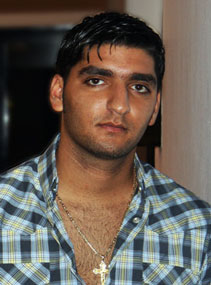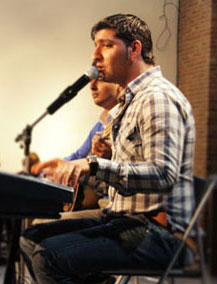|
 Assyrian singer Nuwell Bektas
When Nuwell was nine years old, he got a guitar from his brother-in-law. It had only one string, sounded creaky and was almost falling apart. Nuwell: ‘I took the thing with me as a precious gift and I thought I might become a famous artist someday.’ Starting with simple tunes he worked his way up, one step at a time. Practising leads to skill. Nuwell learned to compose songs, play the piano, and he did his utmost to develop the voice of a real singer. His first performance was at a cousin’s wedding, where he had to sing for about one thousand people. Nuwell: ‘I was red as a tomato and I nearly wet myself out of fear, but I did alright in the end. Nowadays, eleven years later, I sing for five thousand people without any trouble at all. Like a good wine I get better with age.’
Performing as a singer can be tiresome business, even with a band of three people backing you up. Nuwell: ‘Sometimes I sing for ninety minutes straight. If I then get onto the dance floor at wedding parties after my performance on stage, I can assure you that I feel exhausted when it is all over.’ Such parties can easily draw in a few thousand people. Nuwell mainly sings dance- and lovesongs then in Assyrian, Turkish, Kurdish and Arabic alike. He considers it quite normal: ‘The more languages I can express myself in, the better. Singing in Dutch? Why not! If somebody could teach me English, I’d gladly bring songs in that language. It can even be African for all I care.’
Hassana Heartache
Nuwell gets the inspiration for his songs from old Assyrian singers. Their music touches and inspires him. Sometimes he also listens to modern western music, but it doesn’t turn him on. On the other hand he truly likes Moroccan music, which is why he also sings in Arabic. Unfortunately he hasn’t really mastered that language and so he needs his drummer to help him out with writing the lyrics. On top of that Nuwell sings about personal experiences as well. Both the good and the bad times get covered, and sometimes he even writes songs about heartache. Nuwell: ‘I don’t answer to the advances of girls who just want me because I’m a pretty famous singer. My girlfriends have to get to know the real Nuwell, including his personality and his flaws. They should love me not for what I am, but for who I am!’
Another source of inspiration are the stories about Hassana, the village in the southeastern part of Turkey where his father and the majority of the Assyrian refugees, now living in the Belgian town of Mechelen, are born. Nuwell has a genuine connection with that village: ‘One song on my latest album Yemi goes about the catastrophe in the village. Turkish army forces and Kurdish PKK-rebels fought their dirty war in the neighbourhood of Mount Cudi. Hassana is situated in the foothills of that mountain and in the early nineties, nowadays almost twenty years ago, all Assyrian villagers were evicted from their homes by the Turkish army. What could we do against soldiers with machine guns and armored cars? The only option was to run for our lives.’ Some Assyrians from Hassana went to Marseille, others went to Holland, Germany, Sweden or other places in Europe, but the greater part of Nuwell’s community has finally settled down in Mechelen. Four year ago Nuwell went to Turkey and visited Hassana. It was a sad experience. The whole village was destroyed and what was left of it, was just a huge pile of rubble. Nuwell: ‘Sometimes people ask me why I sing in Kurdish. They say that besides the Turkish soldiers Kurdish neighbours were just as well responsible for the loss of Hassana. I don’t want that part of our history to become an obsession in my head. You cannot keep on hating and mourning, especially when you hear the beautiful music the Kurds have.’
 Love songs and Assyrian culture
The first album has got a very special meaning for Nuwell. Its title is Mamo Tuma and it is dedicated to Qasha Tuma, the last priest of Hassana and the deceased uncle of his father. Nuwell: ‘When we fled Hassana, Qasha Tuma stayed behind in the region. He kept an eye on the village, he didn’t want to let the Kurds take over the fields. He couldn’t get over the destruction of the village and that sorrow really broke his heart. He died in 2005 in Turkey. It is not far-fetched to say that the last living part of Hassana got buried together with him.’
Singer with a dream
Nuwell can make a living with his music. Don’t think though that he is filthy rich and leaves concert halls with his pockets full of money, he also needs to pay his band after all. But still it’s the only job he would ever want to do. Nuwell: ‘When I had finished school and could start working as a builder, I spent a year on a construction site. It was backbreaking work, the dust was killing me and would get stuck in my throat, with obvious consequences for my voice. So I naturally gave up on that. Now I regret ever having tried to become a builder. Even if they paid me two hundred euro per hour, you’ll never see me on a construction site again!’
Sometimes people tell Nuwell that at his age he has already achieved a lot. He doesn’t deny that, but there is still a lot more he wants to achieve. Nuwell: ‘It’s like building a wall, layer by layer, making it higher and higher. My dream is to become an international star and unite the Assyrian people with my music. Worldwide we Assyrians are one big family, but we have lost our homeland and that is a serious handicap. It currently seems like our community is drifting apart. Well, I will try to stop that from happening. I do this by singing about love, about our culture. Keeping the Assyrians together is one of my goals. Getting as high as possible and becoming a singer our Assyrian people can be proud of - I’m going to do everything for that, and invest everything I have in it. Down to my last penny.’
Text - Peter Vervloet
|

 Culture & Traditions
Culture & Traditions  Community & Customs
Community & Customs  Bektas Blues
Bektas Blues

 Culture & Traditions
Culture & Traditions  Community & Customs
Community & Customs  Bektas Blues
Bektas Blues